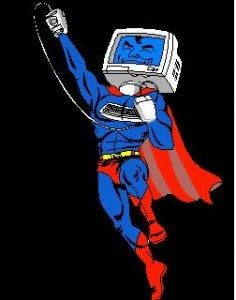Use Your Idle Computer Time to Save the World

Share
The World Community Grid wants to turn you spare computer power into life saving change around the globe. Sponsored by IBM, the WCG is a nonprofit that partners with research teams to help them analyze data and run simulations. Each person who joins WCG donates their idle computer time to solve a fraction of a larger problem. Put together, the fleet of WCG computers give scientists an amazing amount of processing power. WCG targets that research which it feels will best serve the global community. It has worked to help fight Dengue Fever, AIDS, Muscular Dystrophy, and many other illnesses as well as help design better breeds of rice. Joining the WCG is as easy as registering, downloading a software program, and letting your computer work while you're not using it. About 500,000 people belong to WCG, providing 1.4 million computing devices and 320,000 years worth of data processing! Visit the WCG website now and learn how you can use your untapped resources to save lives.
Public distributed computing is a powerful concept, and one that's well tested. The technique has been used to search for extraterrestrial life (SETI), study protein folding (Folding@Home) and many other large scale computational projects. The WCG uses BOINC as its distributing computer platform, which is one of the most widely respected and successful systems for this type of processing in the world. Many think of distributed computing (in one of its forms) as the next step in increasing processing power. Eventually, all the computational intensive projects in major research institutions may rely on this technique to help them analyze data and run simulations. The super computers of the future may not be housed in a single structure, they'll be divided among millions of PCs around the world.
Be Part of the Future
Sign up to receive top stories about groundbreaking technologies and visionary thinkers from SingularityHub.


With so many different distributed computing projects that could ask to use your idle time, WCG does its best to entice you to join. First, it's one of the only such projects that specifically targets research with a global service mindset. Second, it lets you socialize with other members and form teams. Third, it awards points to each participant in relation to the amount of processing they give to the collective. Finally, teams can compete for points in different projects, and the winners are listed on leader boards to gain them bragging rights. I find this last tactic really brilliant. There's something about earning points, forming teams, and competing that drive us to invest ourselves in a task. By taking advantage of that tendency WCG gets people hooked on saving the world. Not a bad addiction.
[image credit: Carlo Artieri]
Related Articles

Thousands of Everyday Drone Pilots Are Making a Google Street View From Above

Scientists Send Secure Quantum Keys Over 62 Miles of Fiber—Without Trusted Devices

This Light-Powered AI Chip Is 100x Faster Than a Top Nvidia GPU
What we’re reading
